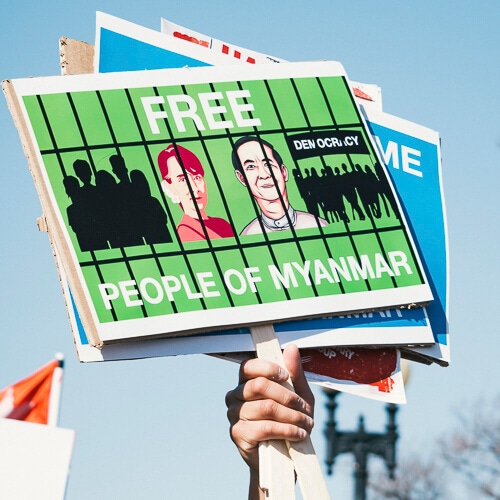As if COVID-19 were not enough to contend with, Telenor's Myanmar business reels from the effects of February's coup and its aftermath.

In early February, Myanmar's military cut off much of the nation's connectivity after rounding up civilian leaders and announcing a state of emergency.
The new regime imposed network restrictions for all operators, and on March 15 ordered a nationwide shutdown of mobile data networks. The effect on Telenor, which provides mobile services in Myanmar, has been immediate and severe.
Sigve Brekke, president and CEO of Telenor, described the situation in Myanmar as "irregular, uncertain, and deeply concerning."
Figure 1:  Call it out: The recent military coup in Myanmar saw communications systems taken down.
Call it out: The recent military coup in Myanmar saw communications systems taken down.
(Source: Gayatri Malhotra on Unsplash)
The Norway-based operator said on Tuesday that it has fully impaired Telenor Myanmar in its first-quarter results, booking a loss of 6.5 billion Norwegian crowns (US$783 million) and removing the operation from its corporate outlook for 2021.
"Due to the worsening of economic and business environment outlook and a deteriorating security and human rights situation, we see limited prospects of improvement going forward," the group said.
As a result of the writedown, group net earnings fell to a loss of NOK3.9 billion ($469 million) in the first quarter from a year-ago profit of NOK698 million ($84 million).
The coup in Myanmar is not the only challenge in Asia, which accounts for more than half of the group's top line. Here, sales have been squeezed largely by pandemic-induced drops in international roaming.
In the first quarter of 2021, Telenor said revenue development in Asia remained challenging, "despite the increase in subscriber base in all markets except Malaysia. However, month on month improvements are generally seen in the revenue trends, supported by a strong subscriber intake."
In April, Telenor and Axiata also announced plans to merge their Malaysian operations. The combination of Axiata subsidiary Celcom and Telenor's Digi would create Malaysia's largest mobile operator. Telenor said the two groups are working towards finalizing agreements within the second quarter of 2021 following due diligence, although it warns "there is no certainty that these discussions will result in any agreement."
Subscriber boost
Despite the challenges, Telenor was still able to increase group mobile subscriptions by 5 million to 187 million, which it said was fully attributed to its operations in Asia.
It even managed to add 2 million subscribers in Myanmar, while Grameenphone in Bangladesh and Telenor Pakistan reported respective increases of 1.7 million and 1.3 million subscriptions.
Interested in Asia? Check out our dedicated content channel here on Light Reading.
In the Nordics, Sweden and Denmark gained 43,000 new subscriptions in total, while DNA in Finland and Telenor Norway ended the quarter with a lower customer base.
Group revenue in the first quarter fell by 1.6% to NOK28.9 billion ($3.47 billion) on an organic basis, while organic earnings before interest, tax, depreciation and amortization (EBITDA) fell by 2%.
Reported EBITDA before other items fell by NOK 1.1 billion to NOK13 billion ($1.56 billion) and the EBITDA margin was 45%. According to Reuters, this was in line with an analyst forecast of NOK13.1 billion.
Telenor reiterated its full-year guidance for overall organic revenue and earnings to remain unchanged year-on-year from 2020, excluding the Myanmar impact. Capital expenditure is still expected to amount to between 15% and 16% of sales.
Related posts:
— Anne Morris, contributing editor, special to Light Reading
About the Author(s)
You May Also Like










